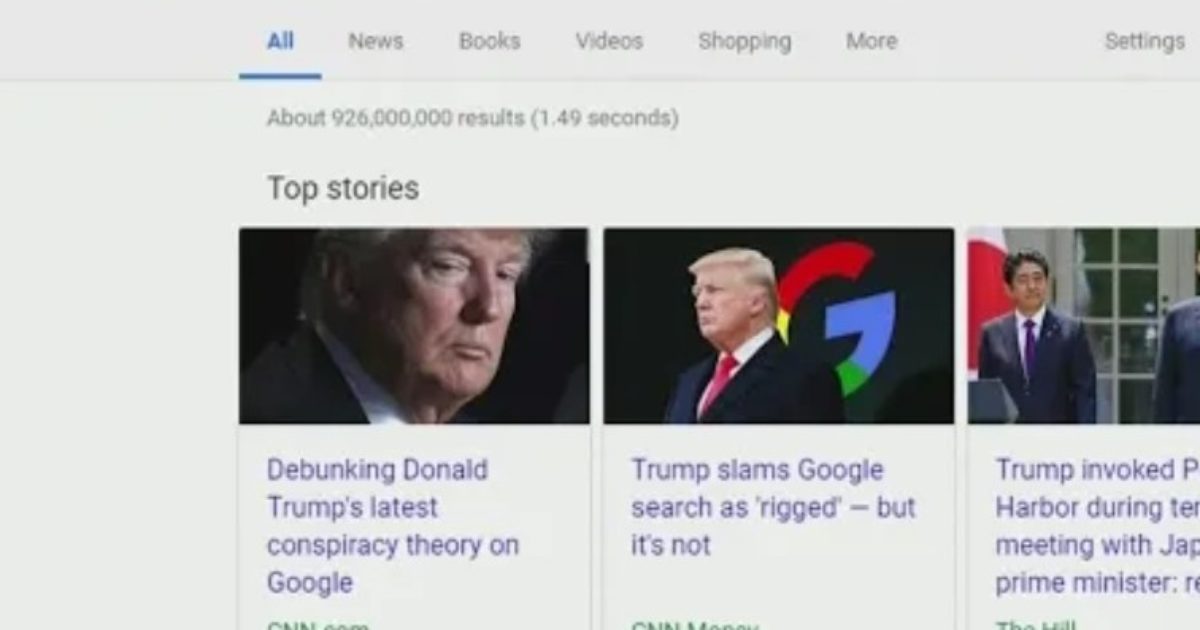Google continues on their ultimate quest to be the decipher of truth.
In a recent blog post from Google the company announced that they have changed their search algorithms to identify news stories as unreliable due to its information.
The Search engine is now piloting this new feature in different countries, so when a news article is faster than the mainstream media in reporting a story Google will more than likely flag that article as unreliable.
Google went on record saying they will issue “a notice indicating that it may be best to check back later when more information from a wider range of sources might be available” for article that just hit the web.
Facebook has been infamous for the way they blocked certain new stories on Facebook regarding anything regarding the 2020 presidential election and COVID-19 but now it looks like Google will follow Facebook’s lead in censorship.
Google starts warning users if search results are likely to be poor https://t.co/noTRLayD3B
— Guardian Tech (@guardiantech) June 25, 2021
It is sort of like putting speed bumps on "the information superhighway"
Google starts warning users if search results are likely to be poor https://t.co/dD5KkuFnYJ
— Steve Dotto (@dottotech) June 26, 2021
The Guardian had more on the story:
Google has started warning users when they search for a topic that is likely to have poor results, as part of its effort to tackle “data voids” on the search engine.
The new warning was spotted by Renee DiResta, an academic who studies misinformation at Stanford University. “It looks like these results are changing quickly,” Google will now caution users. “If this topic is new, it can sometimes take time for results to be added by reliable sources.”
“First time I’ve seen this response from Google Search,” DiResta said. “Positive step to communicating that something is newsy/breaking (my search was for a breaking culture war story), and highlighting that facts are not all known or consensus on what happened is still being formed.”
While social media is regularly linked with misinformation, researchers have long cautioned that search engines can be powerful tools for spreading falsehoods. Data voids, search engine queries that have little to no results, can often lead to fringe claims being given undue prominence – a particular concern for breaking news.
https://twitter.com/BryanFavata/status/1410271530483920897
The Sun got the scoop too, see what they had to add:
Google has begun warning users that its search results may be unreliable.
Google announced the change earlier this month and has now begun testing it in some regions, according to a recent blog post.
Upon searching for keywords surrounding a breaking story, a warning reads: “It looks like these results are changing quickly”.
The message continues: “If this topic is new, it can sometimes take time for results to be added by reliable sources”.
In its June 25 blog post, Google suggested that users of its popular search engine may want to check back later when it’s found more results.
“While Google Search will always be there with the most useful results we can provide, sometimes the reliable information you’re searching for just isn’t online yet,” Google said.
The company said it has trained its search algorithms to spot when a topic is rapidly evolving and a range of sources haven’t weighed in yet.
GOOGLE has begun warning users that its search results may be unreliable.
The feature is aimed at breaking news stories, when information is often rapidly changing and sometimes inaccurate.
So Google is going to tell you what's real and what isn't.https://t.co/MAdoSqxlKH
— No Liberals (Conservative News and Opinion) (@NoLiberals) June 29, 2021



Join the conversation!
Please share your thoughts about this article below. We value your opinions, and would love to see you add to the discussion!